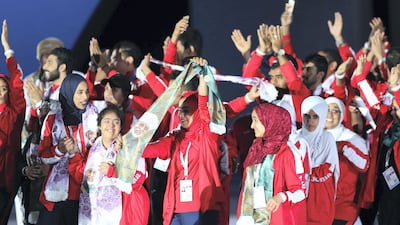Sports clubs for people of determination across the UAE have been supplied with eight defibrillator machines to enable Special Olympics athletes to train safely.
The life-saving devices were donated by the Special Olympics UAE, with training delivered to the clubs by the UAE's National Ambulance service, it was announced on Thursday.
The programme is part of the “train safely” initiative, which aims to provide a high level of care for those with disabilities in a sporting environment. Twenty more machines are on the way later this year.
An automated external defibrillator (AED) can restore a normal heart rhythm in victims of sudden cardiac arrest.
“Special Olympics UAE’s commitment to equip their sports centres with lifesaving AED devices is a pioneering step,” said Ahmed Al Hajeri, the chief executive of National Ambulance.
“It will undoubtedly contribute to improving the infrastructure efficiency of facilities and sports bodies for people of determination and raise the preparedness for emergency situations.
“The success of our partnership with Special Olympics UAE has already resulted in many achievements, including the strengthening of the safety standards offered in the clubs and enhancing the ambulance knowledge and a prevention culture among their coaches," Mr Al Hajeri said.

“This latest phase will further improve our support for them.”
Defibrillation within the first few minutes of having a sudden cardiac arrest boosts chances of survival to more than 70 per cent.
The in-built computer checks for a heart rhythm through adhesive electrodes and calculates whether defibrillation is required. If so, a recorded voice prompts the rescuer to activate the shock button to momentarily stun the heart.
Training for coaches in how to use the devices and general first aid treatment has already been completed.
Fast access to emergency equipment and first aid can greatly improve the chances of survival for those who suffer a heart attack, particularly during bouts of intense exercise.
Eight locations were covered in this phase of the heartsaver programme, including clubs for the disabled in Abu Dhabi, Al Ain, Al Dhafra, Dubai, Al Thiqa, Ras Al Khaimah, Khorfakkan and Sharjah City for Humanitarian Services.
“The development of our sports programme is subject to a sustainable vision focused on enhancing all aspects of sports sectors; including facilities, stadiums, professional and specialised skills and competencies, as well as lifesaving technologies and equipment,” said Talal Al Hashemi, national director of Special Olympics UAE.
“The more we can support their efforts the better the results will be which reflects enormously on our nation’s objective to support people of determination.”
The Special Olympics 2019 was held in Abu Dhabi. It was the first city in the Middle East to stage the games for children and adults with intellectual and physical disabilities.
Special Olympics Abu Dhabi Closing Ceremony - in pictures








































